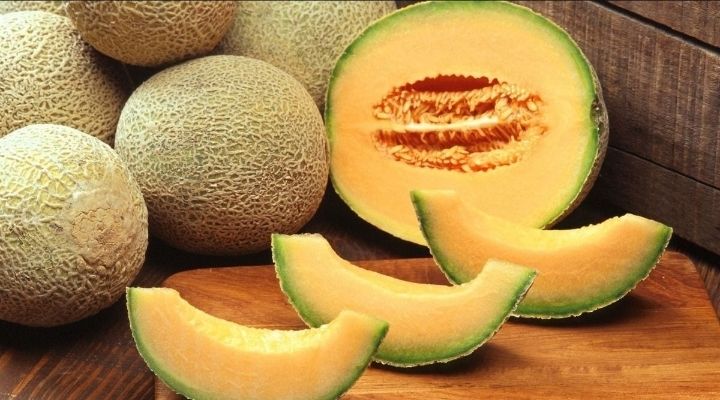
Source
Cucumis melo L. is the Latin name for melon. The orange melon, often known as cantaloupe, is one of the various varieties of this fruit.

Source
This fruit, which is a member of the Cucurbitaceae family, which includes pumpkins, provides a wider variety of nutrients than other fruits. Water is one of the components. Around 90% of the total comes from the fruit's flesh. Regarding other nutrients, they include salt, potassium, calcium, phosphorus, iron, energy, protein, and fat.

Source
One 100-gram melons's worth of nutrients contains the following ingredients: equivalent to 36 kilograms of energy. protein equivalent to 0.5 grams. up to 0.15 grams of fat. up to 9 grams of carbohydrates. About 9 grams of fiber. 0.04 milligrams or less of thiamin (vitamin B1). Up to 0.01 milligrams of riboflavin (vitamin B2). 0.4 milligrams of niacin (vitamin B3). 0.16 milligrams of pantothenic acid (vitamin B5). As much as 0.09 milligrams of vitamin B6. as much as 18 milligrams of vitamin C. Around 6 milligrams of calcium. up to 0.17 milligrams of iron. About 11 milligrams of phosphorus. Around 228 milligrams of potassium. Around 18 milligrams of sodium. up to 0.09 milligrams of zinc.

Source
From the nutrients listed above, the melon fruit has the following health advantages for the body:
Prevent dehydration
Fatigue, dry lips, headaches, and decreased frequency of urine are all symptoms of dehydration. The body is unable to perform its duties as a result of this issue because of a shortage of fluid in the body. Melon fruit is good in assisting in overcoming the signs of dehydration because it contains 90% water. Also, the numerous minerals in it aid in the body's restoration of electrolytes.Address pregnant women's nutritional needs
Vitamin and mineral requirements for pregnant women are higher than usual. Potassium, which is present in melon, can support heart and blood vessel function. The consumption of vitamin C, which acts by enhancing pregnant women's immune systems, supports the advantages of melon fruit. In this way, they are protected against illnesses that can harm the fetus.Enhance digestive wellness
Due to its high water and fiber content, melon has digestive advantages. When consumed together, these two intakes provide the stool a fuller, softer texture that makes it simpler to pass. While having a lower fiber level than other fruits, melon is nonetheless beneficial for those who are not accustomed to eating fiber. Their digestive system will gradually adjust to frequent bowel movements.Bring blood pressure down
These nutritious foods contain sodium and potassium, which can reduce and stabilize blood pressure in the body. You can prevent heart disease with the help of this benefit, which improves heart health. The sodium in melons raises blood volume in people with low blood pressure by binding to fluids. Meanwhile, the potassium in it can assist maintain a healthy blood volume in persons with high blood pressure.Boost defenses
This melon's vitamin C content accounts for its health advantages. These nutrients can speed up the immune system's delivery to infection sites and encourage cells to consume disease-causing bacteria. You shouldn't eat melons frequently, despite the fact that they are healthful. Due to the fact that its consumption might result in digestive issues marked by bloating, nausea, and diarrhea. Melons may cause allergic reactions in persons who already have allergies. Many symptoms, including itchiness, skin rash, diarrhoea, nausea, vomiting, and shortness of breath, are indicative of this illness.

